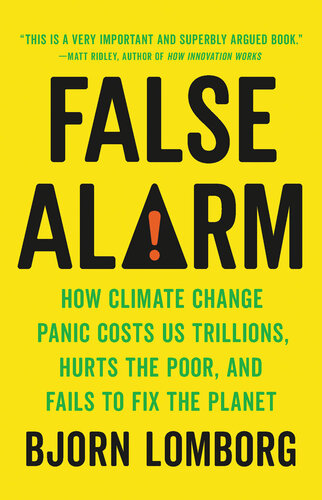
False Alarm
How Climate Change Panic Costs Us Trillions, Hurts the Poor, and Fails to Fix the Planet
کتاب های مرتبط
- اطلاعات
- نقد و بررسی
- دیدگاه کاربران
نقد و بررسی

May 15, 2020
Climate change is manageable, one analyst asserts. Prague-based Danish political scientist Lomborg, president of the think tank Copenhagen Consensus Center and visiting fellow at Stanford's Hoover Institute, follows his previous critiques of climate change policy--e.g., Cool It: The Skeptical Environmentalist's Guide to Global Warming (2007)--with a hard-hitting analysis of failing strategies for addressing what he acknowledges is "a real problem." He believes that "apocalyptic narratives," echoing past panics about overpopulation, mass famine, and toxins, are hyped by the media and actually misrepresent evidence both of climate threats and the efficacy of solutions such as solar and wind technology, electric cars, and individuals' efforts to limit energy use. Often citing U.N. climate and environmental studies, Lomborg argues that the prevalence of climate disasters such as flooding and wildfire is not increasing globally but rather the costs of damages that result from overbuilding are rising. The author's least convincing argument focuses on humanity's "remarkable ability for adaptation," which he says does not factor into climate change predictions. If global temperature will rise 7.5 degrees Fahrenheit by the end of the century without any human intervention--a figure he does not dispute--people will respond by buying air conditioners and setting up cooling centers for those who cannot afford them. Wheat farmers will look to other crops or grain varieties or move their farms north. Lomborg is a strong critic of the patchwork Paris Climate Agreement, which, he writes, "will cost a fortune to carry out and do almost no good." Other worldwide problems, including disease, hunger, and poverty, require urgent attention and could be mitigated by free trade, fighting early childhood malnutrition, and providing immunizations and access to contraception. Raising living standards globally, along with smart carbon taxes, geoengineering innovations, development of artificial meat, and increased fuel efficiency for planes can address climate change in the long run. A serious, debatable assessment of a controversial global issue.
COPYRIGHT(2020) Kirkus Reviews, ALL RIGHTS RESERVED.

May 25, 2020
Danish statistician and political scientist Lomborg (Cool It) brands climate change warnings as alarmist, and argues that a massive reduction in fossil fuels would exacerbate global poverty, in this detailed contrarian account. Lomborg insists that climate change isn’t advancing as quickly as many people believe, and claims that technological innovations will allow humanity to adapt to rising sea levels and increased temperatures. He analyzes data from the UN and other climate organizations to argue that the links between global warming and natural disasters aren’t as strong as some authorities believe, points out the limitations and high costs of renewable energy sources like solar and wind power, and contends that the continued use of fossil fuels will eliminate “extreme poverty” by 2050. Instead of the standard renewable energy pursuits, Lomborg suggests that climate change can be effectively mitigated with a modest carbon tax that gradually increases over time, and with innovations in energy storage and geoengineering. While Lomborg is careful to back his cost-benefit analyses of climate policies with surveys and statistics, he overhypes the risks posed by the “extreme language” of environmentalists and fails to fully address the impact of climate change deniers on the debate. This is sure to spark controversy.

























دیدگاه کاربران